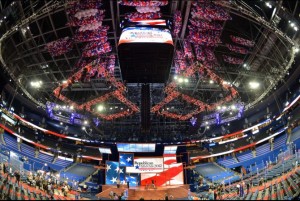 Coverage of the 2012 Republican National Convention finally begins today, after Monday’s originally scheduled start was scuttled for weather concerns.
Coverage of the 2012 Republican National Convention finally begins today, after Monday’s originally scheduled start was scuttled for weather concerns.
That means a lot of things are squeezed into the remaining three days of coverage.
But from the start, the dramatic roll call nomination of the president and vice presidential candidates was going to be squeezed into the first day, to call attention away from votes that won’t be for the presumptive nominee Mitt Romney.
Those are scheduled now to happen in the late afternoon.
Gavel to gavel coverage will happen on CSPAN and the latest schedule has welcoming speeches from Republican National Chairman Reince Priebus and others starting at 2 p.m. and an evening program at 7 that includes a keynote by Gov. Chris Christie of New Jersey and Ann Romney as well as words from governors Nikki Haley, Brian Sandoval, Scott Walker, Bob McDonnell, Mary Fallin, John Kasich as well as U.S. senators Kelly Ayotte and Rick Santorum and Rep. Cathy McMorris Rodgers.
Of the broadcast networks, PBS will provide the most prime time coverage, from 8 ato 11 p.m. One hour updates are scheduled from ABC and NBC at 10 p.m. And there’s nothing on the prime time schedule from CBS News, which has opted for reruns tonight.
“This is a great example of stepping into where the commercial marketplace isn’t delivering,” says John Wilson, senior vice president and chief of TV programming at PBS “The public looks to PBS for that kind of content.”
PBS correspondent Judy Woodruff says it’s a chance to show for a few hours four nights a week every four years where each party wants to take the country.
It is she says, “a worthwhile exercise; [showing ] that not everything has to be condensed down to just a few minutes. And so we give it’s our opportunity to give the Democrats and to give the Republicans a chance to tell their story.”
There is a chance to ask “a whole lot of questions,” Woodruff says. “But we think basically it’s their chance. It’s their chance to tell their story.”
George Stephanopoulos of ABC News calls conventions “the only time, I think, when you see each party get the chance in a concentrated way to make their case, and in an election that is this close, where you know is likely to be deadlocked all the way to November, this is especially critical.”
True, not much news breaks at conventions, Stephanopoulos says, because “neither party wants much to happen behind the scenes at the conventions anymore. I think our job is to try to break down what exactly they’re trying to do and then give them the chance to make their case.”
But it’s a reporter’s job to break in an explain things, says PBS correspondent Gwen Ifill. “If anything cries out for explanation and analysis, it’s these political conventions.”
CBS is just about the only organization without prime time slated for the convention at all – a big contrast to the days when their booth dominated coverage, helmed by Walter Cronkite.
But Jeff Fager, chairman of CBS News, says, “Cronkite did it, there was actually real news breaking out. And that’s a big difference. And so not that it isn’t important [now], because we do think it’s very important. But there was a reason to cover it all the time. Anything could change that would have a major impact.”